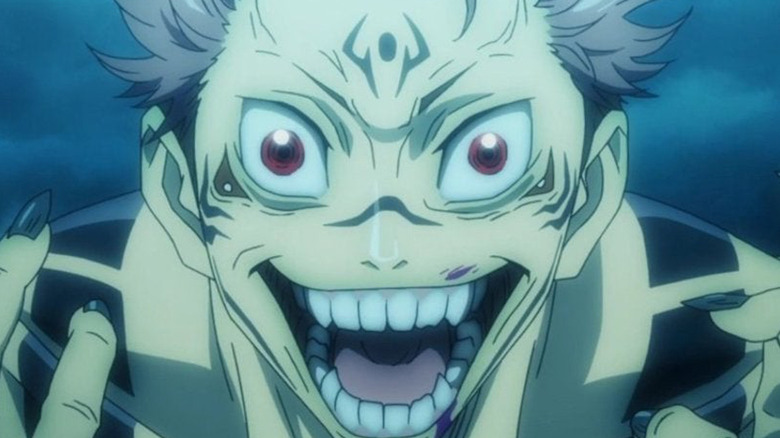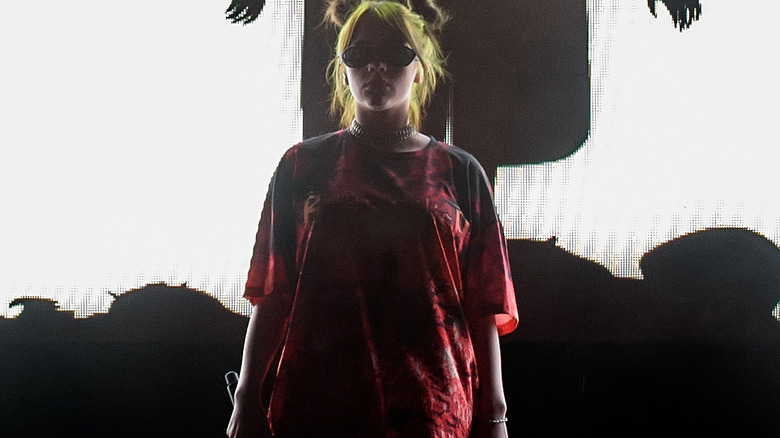The Surprising Influences Behind Gege Akutami's Jujutsu Kaisen
"Jujutsu Kaisen" is one of the most recent hits in a long lineage of franchisable series published in the pages of Weekly Shonen Jump. In the past, the weekly comic book anthology has featured the debuts of influential works like "One Piece," "Naruto," and "Dragon Ball," among countless others (via Anime News Network).
In 2020, an anime adaptation of "Jujutsu Kaisen" debuted in both Japan and simultaneously stateside through Crunchyroll. It has since become available on HBO Max. According to Parrot Analytics, "Jujutsu Kaisen" is in the top 3% of the most popular TV series, and at the 98.4th percentile relative to all other animated series domestically. Furthermore, their data has determined that the American popularity of "Jujutsu Kaisen" is a full 97% of its popularity in its home country of Japan, suggesting the series is a legitimately international hit.
"Jujutsu Kaisen" author Gege Akutami, who works anonymously under a pen name, was understandably inspired by a number of shonen series that came before it while writing the source material for the hit TV series. For example, in an article on Otaquest, author Chris Cimi outlined how "Bleach" was a significant influence on Akutami's work. That said, Akutami also drew from some other sources outside of the realm of anime entirely that likewise made an imprint on what "Jujutsu Kaisen" has become today.
Blumhouse, Buddha, and Billie Eilish
In an interview published on German website JAPANDIGEST (translated using Google), interviewer Kei Okishima asked Gege Akutami about their interest in the horror genre. "Jujutsu Kaisen" is something of a horror-action series, featuring evil spirits known as "curses" as its villains, who battle human magic wielders in combat. Akutami responded that they enjoy "everything that scares me," including Blumhouse horror hit "Get Out," A24 Films' "Hereditary," and the found footage genre as a whole.
On its surface, "Jujutsu Kaisen" doesn't resemble "Get Out," "Hereditary," or the mundane horror of, say, "The Blair Witch Project" whatsoever. That said, prior to engaging in combat, the curses of "Jujutsu Kaisen" are often inflicting psychological terror on innocent victims, so it's for those scenes that Akutami is likely drawing influence from the aforementioned films.
Akutami was likewise influenced by Buddhist and Japanese mythology when conceptualizing the villainous curses of "Jujutsu Kaisen." In a piece titled "Reviving the Modern Exorcism Genre," author Jalil Shareef pointed out how Ryomen Sukuna, the curse that inhabits the body of protagonist Yuji Itadori, is culled directly from Japanese legend. Cover images for individual chapters of "Jujutsu Kaisen," meanwhile, depict Sukuna as a Buddhist deity.
Finally, though this regards the "Jujutsu Kaisen" anime and not the manga, it's nevertheless worth mentioning that Billie Eilish was an influence on the series, too. In an interview published by Crunchyroll, the anime's music producer Yoshiki Kobayashi recounted how Akutami themself suggested a soundtrack similar in sound to Eilish's musical style.
While the huge, international success of "Jujutsu Kaisen" is likely the result of a confluence of factors, these wide-ranging and international influences very well could have helped contribute to the series' present-day popularity.

